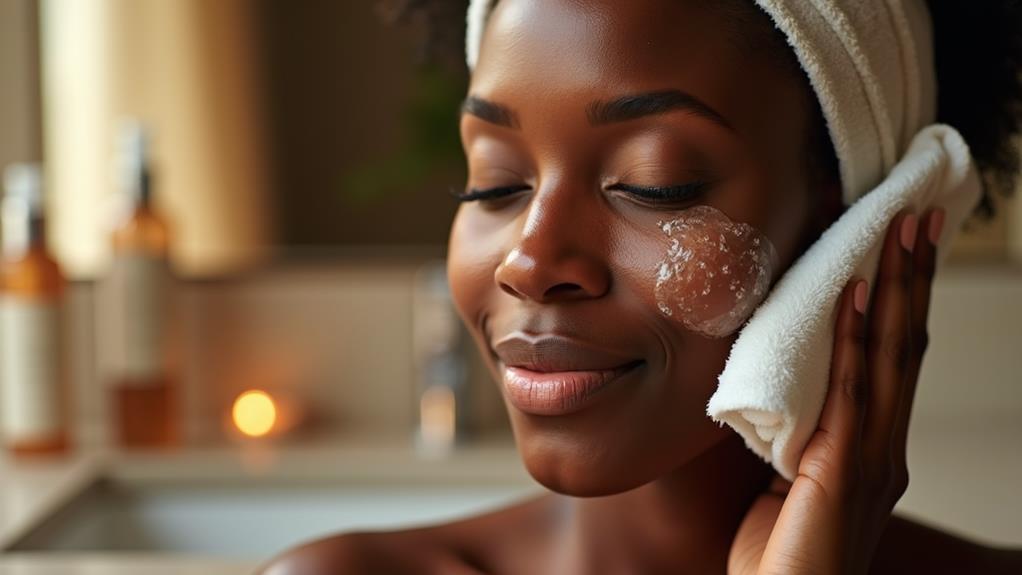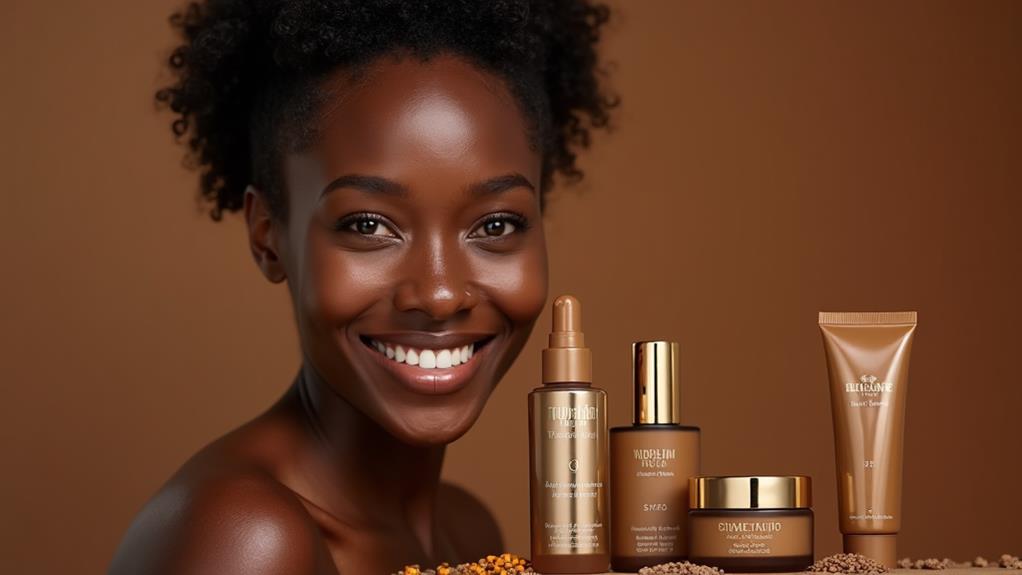You've probably heard countless skincare tips, but have you ever wondered if they're truly suitable for melanin-rich skin? While many general skincare principles apply, there are specific considerations you should keep in mind to maintain healthy, glowing skin. From gentle cleansing to targeted treatments, each step plays an important role in addressing the unique needs of your skin tone. By understanding these essential steps, you'll be better equipped to tackle common concerns like hyperpigmentation and uneven texture. Ready to discover how to elevate your skincare routine and achieve that radiant complexion you've always wanted?
Gentle Cleansing

While cleansing is essential for all skin types, it's particularly crucial for melanin-rich skin to maintain a gentle approach. Harsh cleansers can strip away natural oils, leading to dryness and potential hyperpigmentation. You'll want to opt for mild, non-foaming cleansers that effectively remove impurities without disrupting your skin's delicate balance.
When selecting cleansing techniques, consider using lukewarm water rather than hot, as excessive heat can cause irritation. Gently massage the cleanser onto your face using circular motions, avoiding aggressive rubbing. Rinse thoroughly and pat your skin dry with a soft towel.
For product recommendations, look for cleansers containing hydrating ingredients like glycerin or hyaluronic acid. Avoid formulations with sulfates, alcohol, or strong fragrances, as these can be potentially irritating. Cream or oil-based cleansers are often well-suited for melanin-rich skin, providing nourishment while effectively removing makeup and impurities.
Cleanse your face twice daily, in the morning and evening. However, if you have particularly dry or sensitive skin, you may opt for a water-only rinse in the morning and a gentle cleanse at night to prevent over-cleansing.
Exfoliation and Skin Brightening
After establishing a gentle cleansing routine, it's time to address exfoliation and skin brightening for melanin-rich skin. Exfoliation is vital for removing dead skin cells and promoting cell turnover, but it's important to approach it carefully to avoid hyperpigmentation.
For melanin-rich skin, chemical exfoliants are often preferable to physical scrubs. Alpha-hydroxy acids (AHAs) like glycolic or lactic acid, and beta-hydroxy acids (BHAs) like salicylic acid can effectively exfoliate without causing micro-tears in the skin. Start with a low concentration and gradually increase as your skin adapts.
When it comes to skin brightening, focus on natural brighteners that don't compromise your skin's melanin production. Ingredients like vitamin C, niacinamide, and licorice root extract can help even out skin tone and reduce the appearance of dark spots without bleaching the skin.
Kojic acid and alpha-arbutin are also effective for targeting hyperpigmentation.
Remember to introduce these products slowly into your routine, starting with once or twice a week. Always follow up with a broad-spectrum sunscreen to protect your newly revealed skin cells and prevent further pigmentation issues.
Hydration and Moisture Balance

Beyond exfoliation and brightening, hydration and moisture balance play significant roles in maintaining healthy melanin-rich skin. Your skin's ability to retain moisture is vital for maintaining its barrier function and overall health. To optimize moisture retention, you'll need to incorporate hydration products tailored to your skin type.
For melanin-rich skin, which can be prone to dehydration, it's important to use a humectant-rich moisturizer. Look for ingredients like hyaluronic acid, glycerin, or aloe vera, which attract and bind water to the skin.
Follow this with an emollient or occlusive product to seal in the hydration. Oils such as jojoba, argan, or squalane work well for this purpose without clogging pores.
Don't forget to hydrate from within by drinking adequate water throughout the day. You should also consider using a facial mist containing hydrating ingredients to refresh your skin midday.
Be mindful of environmental factors that can lead to moisture loss, such as air conditioning or low humidity. Using a humidifier in your living space can help combat these effects and maintain your skin's moisture balance.
Sun Protection
Sun protection is a cornerstone of skincare for melanin-rich skin. While melanin provides some natural defense against UV radiation, it's not sufficient to prevent all sun-related damage. You'll need to incorporate a broad-spectrum sunscreen with at least SPF 30 into your daily routine, regardless of the weather or season.
When selecting a sunscreen, opt for formulations specifically designed for darker skin tones to avoid the chalky residue often left by traditional sunscreens. Look for products containing zinc oxide or titanium dioxide, which offer effective UV protection without irritating sensitive skin.
Proper sunscreen application is vital. Apply a generous amount to all exposed skin, including often-overlooked areas like the ears, neck, and back of hands. Reapply every two hours, or more frequently if swimming or sweating excessively.
Remember that UV rays can penetrate through windows, so don't skip sunscreen when indoors.
In addition to sunscreen, consider incorporating protective clothing, wide-brimmed hats, and sunglasses into your sun protection strategy. These measures help safeguard your skin from premature aging, hyperpigmentation, and the increased risk of skin cancer associated with prolonged sun exposure.
Targeted Treatment for Hyperpigmentation

Addressing hyperpigmentation is an essential step in skincare for melanin-rich skin. This common concern requires targeted treatments to even out skin tone and reduce dark spots. When selecting serums, look for ingredients like vitamin C, kojic acid, or niacinamide, which are known for their ability to inhibit melanin production and fade existing discoloration.
You'll want to incorporate these treatments into your nightly routine, as some ingredients can increase photosensitivity. Apply your chosen serum after cleansing and toning, but before moisturizing. Consistency is key; it may take several weeks to see noticeable improvements.
In addition to topical treatments, lifestyle adjustments can greatly impact hyperpigmentation. Limit sun exposure and always wear broad-spectrum sunscreen to prevent further darkening of existing spots. Consider incorporating foods rich in antioxidants into your diet, as they can help protect your skin from free radical damage that contributes to hyperpigmentation.
It's important to note that while over-the-counter products can be effective, severe cases of hyperpigmentation may require professional treatments such as chemical peels or laser therapy.
Consult a dermatologist specializing in melanin-rich skin for personalized advice and treatment options.
Conclusion
You've learned the five essential steps for caring for melanin-rich skin. But why stop there? By consistently following this regimen, you'll maintain your skin's health and radiance. Remember, gentle cleansing, careful exfoliation, proper hydration, sun protection, and targeted treatments are key. Be diligent in your approach, and you'll see results. Always consult a dermatologist for personalized advice, especially if you're dealing with specific skin concerns or conditions.


